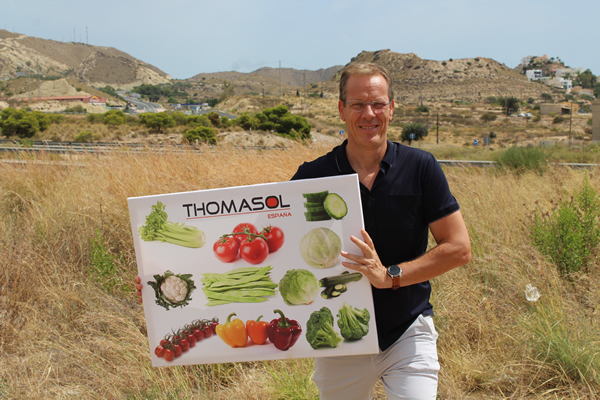ZON has been collaborating for a number of years with Dutchman Thomas Bos, owner of the Alicante-based company Thomasol, in organising the sale of Spanish products in the winter months. ZON magazine had a Skype conversation with him about developments in the Spanish fruit and vegetable sector, among other things.

How did you end up in the fruit and vegetable sector and then in Spain?
"I was really brought up with working with fruit and vegetables. As a child I wanted to work in the greengrocer's shop of our neighbour across the street in Zeddam, where we lived. I was allowed to go to the auction in Zevenaar, to the auction room, prepare orders and you name it. When I got a little older, I was also allowed to stand in the shop, sell at the market, stock up on stores at night and that sort of thing.
"I soon realized that after completing secondary school in Arnhem, I wanted to start working at Van Vliet in Zevenaar right away. After another seven years or so in the meantime, I made a side step to a construction and construction company in the Betuwe, the old love for fruit and vegetables reappeared and in 2001 I started working at Langfruit at Fresh Park Venlo.
"Ron de Greeff had then just entered as director. After two years I indicated that I would like to do something for myself in Spain and in 2003 I went to Spain on my own with the promise that I could take care of the Spanish trade for Langfruit. That is where my "Spanish life and work" started. When things went downhill at Langfruit in 2013 after ten years, I accidentally came into contact with ZON and it turned out that they wanted to set up a project to sell Spanish products in the winter months and were looking for local expertise. "
What does Thomasol do?
"We, like many other companies in this business, make our money trading fruit and vegetables. For example, we have traditional German wholesale customers for whom we can provide the "Spain package" every week. We also mediate, on a fixed and transparent basis, weekly retail programs for suppliers to a number of Dutch, Belgian and German retailers. And we have year-round agreements with Dutch importers and exporters for specific products. But that is only part of our activities.
"By far the most fun thing to do is developing long-term projects such as at ZON, to connect all kinds of lines together with a client and to ensure that a smoothly running business is created from there. For example, in 2006, together with an open-ground family business from Murcia, I set up a line to export broccoli / cauliflower to the Middle East by sea freight. We have completed a project for a German retailer with another open-field cultivation company from Murcia. These are really great projects for me to do. In that respect, I feel much more of a fruit and vegetable developer than a traditional trader."
How do you look back on advising on the ZON project?
"We set up a 'Spanish Auction' working group in 2014, of which I was a member. You do not want to know what is involved in preparations for such a project. Consider, for example, organizing the inspection - at a distance of 2,500 km from Fresh Park Venlo - but also setting up the entire logistics process, inspection reports in Spanish, involving the Quality Assurance department in all certificates and recent product analyses, accurate financial settlement with daily / weekly bills and I could go on for a while.
"I think it is a really great team achievement that we have managed to develop this into a smoothly running process over the past five years and I am quite proud of that. In my opinion, the project now stands strong. A funny detail is that when we started the project in the 2015-2016 season, ZON had just celebrated its 100th anniversary, with the management and several board members of CASI (the largest tomato cooperative in Spain) visiting Venlo for the anniversary party as guests because we were going to do business with CASI. So far I think we have done well, but there is still a lot of work to be done on the project for years to come. In general, Spain is not really oriented towards the "free day market." The real volume is in the fixed week / month / seasonal programs and in order to get the Spaniards enthusiastic about the daily market, you must of course be able to deliver on prices that are on average just as good or better than in the programs. "
Looking back on your 17 years in Spain: how did horticulture develop there?
"Spanish horticulture, and with it the individual companies, has really made a professionalisation move in recent years. In terms of production, but certainly also in terms of commerce. Incidentally, I am of the opinion that quite a lot of attention is paid to the short term and a little less to the long term. A Spanish grower tries to make the best product with the lowest possible investment, while Dutch growers first want to have their cultivation facilities in optimal order and really want to invest in it. "
In addition to ZON, are there any other foreign cooperatives that sell products from Spanish fellow cooperatives?
"No, as far as I know there are some small-scale collaborations on the left and right, but ZON is the only cooperative in Europe that organizes this on this scale and in this way."
What makes the ZON clock attractive for Spanish cooperatives?
"First of all, it is clearly the transparency that ZON pursues in the cooperation on all fronts towards its Spanish partners. There is much appreciation for this in Spain. And also that the Spaniards can often benefit from the good prices in the daily market in this way, at the right times. Of course they don't have to play with the clock, because continuity in the supply is very important to ZON towards the customers."
How is a competitor like Morocco viewed in Spain?
"Especially in the Spanish tomato world, the developments in Morocco are viewed with suspicion, because it is really seen as a very serious competitor. In the meantime, not only tomatoes but also very good peppers, courgettes and aubergines are coming from Morocco and the country has developed into a producer to take into account. The country has of course been able to grab a piece of the market because European countries are no longer allowed to export to Russia and Morocco is. Many Spanish companies have tried to collaborate with Moroccan companies, but due to complex legislative and cultural differences, this has not often been successful.
"In terms of regulations, it bothers the Spaniards enormously that their products and working method must meet all kinds of strict conditions, whereby people often wonder whether this is also applied to the Moroccan product. This competition on cost price is perceived as very unfair. "
In the Netherlands larger growers increasingly want to do the sales themselves and no longer within a cooperative. Does this development also affect Spain?
'No actually not. Spanish cooperatives traditionally have many smaller growers. In Almeria, the average company barely reaches three or four hectares and then of course you have too little volume to do the sales yourself. The big boys with ten or fifteen hectares often have a position on the board of a cooperative and therefore conform to the rules for having the sale done by the cooperative. "
What about the succession in those small companies? In the Netherlands this is quite a problem, especially in the open ground.
"In my opinion, that is less of an issue in Spain. With a pepper farm of roughly three hectares in Almeria, a Spanish family can earn a good living. The children just keep going in Mom and Dad's greenhouse. And also in the Murcia region, where there are many open ground companies, this is hardly an issue. Children continue in their parents' business and remain members of the same cooperative, that's the picture. "
What does corona mean for Spanish horticulture?
"In the first place, as in the whole of Europe, dealing with a lot of extra rules. Just think about organizing transport for your harvest workers, just to name a few. In terms of sales, you see that demand from the catering industry has also stalled for a while in Spain. Fortunately, that has in part been replaced by a strongly increased demand from the retail sector. "
What are your expectations for the coming winter season?
"If you recall for a moment the downtime of aviation in recent months, you might imagine that all the fruit used for smoothies and the like on board those planes was suddenly no longer sold. The contracts were there, but could not be fulfilled. This has enormous consequences for trade and growers. Nobody knows what that will look like next winter. What is the value of contracts if they cannot be fulfilled? In short, a lot of uncertainty and a lot of coffee grounds look at both the cultivation side and the sales side. "
How do you see developments in Spain in the coming years?
"The competition from Morocco will certainly continue, that is clear to me. Europe should take a stand against the current unequal rules / legislation, so that products from Morocco or other non-EU production countries must meet the same requirements as products from European countries. Competition is fine if the playing field is the same for everyone. "
Source: ZON Magazine
For more information:
Thomas Bos
Thomasol Gestion SL 
C. Venta de la Remuda no. 8
03560 El Campello
Alicante - España
Telephone: + 34-669636873
info@thomasol.eu
www.thomasol.eu
"vegetable" - Google News
October 27, 2020 at 07:55PM
https://ift.tt/3dZoULG
Project developer in fruit and vegetables - FreshPlaza.com
"vegetable" - Google News
https://ift.tt/2CyIOeE
https://ift.tt/3aVzfVV
Bagikan Berita Ini














0 Response to "Project developer in fruit and vegetables - FreshPlaza.com"
Post a Comment